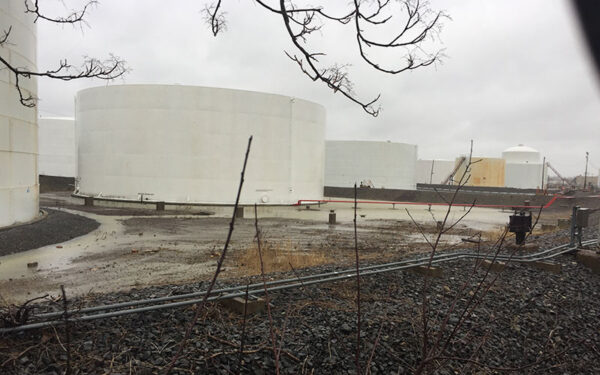
When it comes to national leadership, New England has always been ahead of the curve. The first public school, the first newspaper, the first veteran’s hospital, and even the first microwave oven were all pioneered in our backyard. And on environmental progress, our region’s legacy is just as sterling.
Since long before the age of Trump, New England has consistently shown itself to be a trailblazer in addressing climate change. But with federal obstacles to progress continuing to mount, local leadership is more critical today than ever. That’s why 2018 must be the year we make denial and inaction on climate change a disqualification for holding public office.
We have a lot on the line in New England this November: six governorships, five Senate seats, 21 House seats, and hundreds of local offices. In every one of these races, it’s on us to put climate change front and center. It’s on us to demand commitments to reducing carbon pollution, growing renewable energy, and expanding clean transportation. And then, it’s on us to hold our leaders’ feet to the fire (a metaphor all too fitting for the challenges we face).
Trump’s Out of Paris, But New England Is (Mostly) In
When President Trump announced his misguided plan to withdraw from the Paris Climate Agreement last June, our nation became a pariah among a global community dedicated to fighting climate change – one of only three countries that were not signatories (and the other two, Nicaragua and Syria, have since signed on). But despite resistance throughout New England, New Hampshire Governor Chris Sununu and Maine Governor Paul LePage stood behind the President’s irresponsible decision (as did Maine Congressman Bruce Poliquin).
Don’t say they didn’t warn us. In a 2016 debate, then-candidate Sununu dodged questions of climate change and then expressed uncertainty as to its cause – skepticism he again raised after taking office during a July 2017 interview. And Governor LePage went even further, touting the “upsides” of climate change in Maine during his first term. Add to this his record of defunding energy efficiency programs, opposing wind and solar power, advocating for more fossil fuels, and opposing ocean conservation, and it paints a clear picture of a man determined to unravel climate progress at all costs.
Fortunately, while these two governors backed down, the rest of our New England leaders stepped up. Governors of Connecticut, Rhode Island, Vermont, and Massachusetts jumped to fill in the void left by President Trump, joining ten other states and Puerto Rico to assure New Englanders, the nation, and the world that we remain committed to fighting climate change. And they pledged to act on this promise.
Living Up to Our Legacy
Connecticut’s Dan Malloy has taken steps to ban waste from natural gas fracking and fund clean water initiatives. Rhode Island’s Gina Raimondo committed her state to expanding renewable energy tenfold and creating 20,000 new clean energy jobs in the next three years. Vermont’s Phil Scott created a statewide climate commission tasked with limiting dangerous carbon pollution. And Massachusetts’s Charlie Baker signed into law the nation’s largest commitment to offshore wind energy.
No New England governor has an unscathed environmental record, of course. Pledges and promises remain empty without meaningful action to back them up, and there’s no question that CLF spends time on the other side of the table from these leaders on a variety of environmental issues. But on the whole, these four New England governors are sending a message that environmental progress can and must bridge partisan and ideological divides – a seemingly too-rare sentiment in our current political era.
New and Familiar Faces in 2018
As we head into this latest election season, it’s on us to hold our elected representatives at the local, state, and federal levels to a higher standard. Make sure they know that if they’re unwilling to address climate change, then we’re unwilling to give them our votes.
In particular, this November, Maine’s and Connecticut’s gubernatorial races will feature new faces on both sides of the aisle, with LePage and Malloy stepping down. Together, we have an opportunity to ensure that candidates of both parties use their spotlight to either repudiate (in Maine’s case) or continue (in Connecticut’s case) their predecessor’s climate legacy. And in the rest of New England, where incumbents will face challengers, we need to let sitting governors, members of Congress, state legislators, and local leaders know that they can’t rest on their laurels – words must be backed up with meaningful action – or continue their denial, while making sure their challengers understand that we vote on climate.
Climate Matters, and So Do Our Votes
Here’s the thing. Climate is not just an environmental issue. It’s a public health issue. It’s a social justice issue. It’s an economic issue. It’s tied to every part of life here in New England, and it will impact everything we love about our home. So when we say that candidates must make climate change a priority, it’s because we understand what’s at risk, from our thriving seafood industry, to childhood asthma, to millions in tourism revenue, and so much more. It’s because this is a problem that cannot wait until tomorrow for a solution. And it’s because we know that innovation and ingenuity are part of New England’s DNA.
Just a few months ago, a single voter could have decided control of the Virginia House of Delegates. More than anyone, candidates for office understand the adage that “every vote counts.” And when they hear that your vote, the votes of your friends and neighbors, and the votes of thousands throughout your state will be determined by their willingness to make climate change a priority, they’ll have no choice but to commit or quit.
What Can We Do?
As President Obama said, “We are the first generation to feel the effect of climate change and the last generation who can do something about it.” So let’s do something. Go out to campaign events, rallies, and town halls and ask candidates what they’ll do to address climate change and protect our communities from its impacts. Stop canvassers on the street and press them on their candidates’ plans. Call a campaign’s headquarters and tell them your vote is dependent on these positions. Don’t let them avoid or evade. Ask again and again until you get a meaningful answer.
And for our part, CLF won’t be sitting this one out. We’ll be using traditional and social media to share our opinions on various proposals and platforms. We’ll be mobilizing our members with petitions and action alerts targeted at incumbents and challengers alike. We’ll be highlighting examples of good environmental policy from other states and countries when we see opportunities for local leaders to step up.
And if any candidate, in any state, denies the basic scientific fact that climate change is real, is worsening, and is influenced by our actions, then you can be sure they’ll hear about it from us.
In 2015, 70 years after the invention of the microwave oven, Rhode Islanders began construction on the nation’s first offshore wind farm. We are a region of trailblazers and climate change is the next frontier. Let’s elect leaders ready to take it on.



